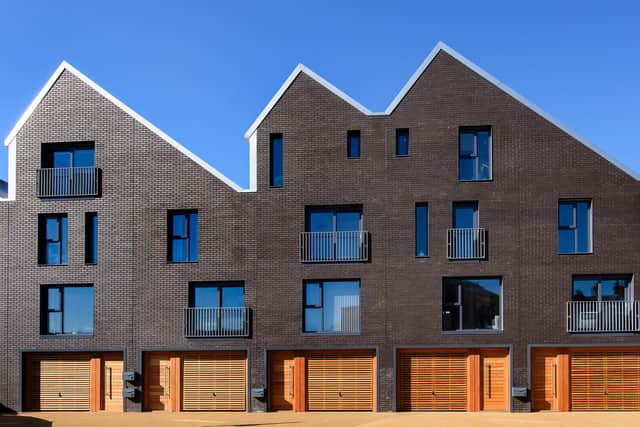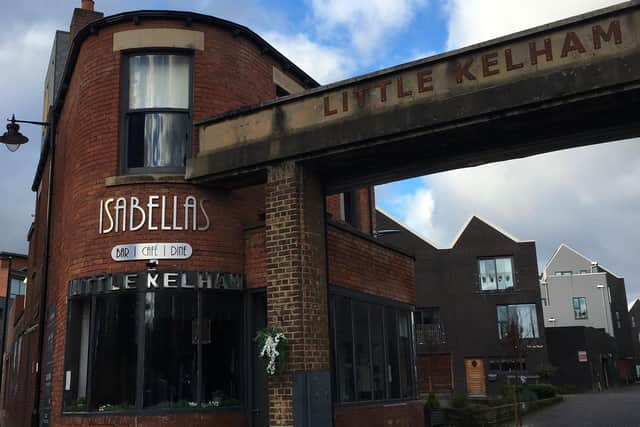Why people are queueing up to buy Scandi style super energy efficient new homes by Citu in Sheffield
Communities the length and breadth of Britain are battling to protect their treasured green spaces from development while housebuilders fight to construct homes on prime sites, where buyer demand would be a foregone conclusion.
These wars are destined to continue, as they always have, though it is highly unlikely that Yorkshire-based CITU will ever become embroiled in one.
Advertisement
Hide AdAdvertisement
Hide AdIt is, as regular Property Post readers will know, a developer with a difference and its modus operandi is not to target the best potential plots but to look for those that others would never even consider. No-go areas are a speciality and the grittier the better.


The company was founded in 2004 by a then 26-year-old Chris Thompson and its first project was converting a former hostel in Beeston, South Leeds, into contemporary apartments powered by ground source heat pumps and solar panels. It was groundbreaking at the time and cemented CITU’s “build it and they will come” approach, which is underpinned by a cast iron commitment to great design, community spirit and tackling climate change.
Kelham Island on the edge of Sheffield centre is a prime example of how successful the firm’s ethos has been. Not in their wildest dreams did anyone imagine that this once a run-down industrial area on the edge of Sheffield city centre would ever be a des res. But the place once famous for its pub crawls and red light district is now one of the hippest places to live thanks to Little Kelham, an area developed into homes by CITU.
Work on the site began in 2015 and the new Scandi-style, low carbon homes have sparked regeneration with other developers buying old industrial buildings in the area to turn into work spaces and apartments, while independent businesses, including cafes, shops and bars have opened up to serve the new clientele.
Advertisement
Hide AdAdvertisement
Hide AdThe venture has been so successful, that CITU is now working on Kelham Central, phase two of the development, which will have 125 homes. Prices range from £160,000 for a one bedroom flat, £260,000 for a two bedroom home and £400,000 for a four bedroom house. When the first phase of the build was released for sale, would-be buyers began queueing at 5am.


This development is running alongside CITU’s 10-year plan to create the Climate Innovation District in Leeds, where the firm now has its HQ and its homebuilding factory CITU Works. The factory makes the components for its homes, including the timber frames, roofs, floors and insulated walls with rainscreen cladding and triple glazed windows already fitted. Once on site, the shell can be erected in two days leaving the assembly squad to fit out the interiors within a few weeks. The air tightness, insulation, solar panels and mechanical ventilation and heat recovery systems mean the properties are inexpensive to run, a major selling point in a time of rising energy bills.
“Kelham was a forgotten site sitting on the edge of the city centre and it’s doubtful that any other developer would’ve touched it but we could see the potential for place making and regeneration,” says CITU development director Jonathan Wilson.Sheffield City Council agreed and have supported CITU’s plans and its radical, zero carbon, supremely energy efficient homes and its bid to create communities. “We clad the first homes in brick to reflect the heritage of buildings in the area but over time the council’s confidence in us has grown and so we are now using a mixture of brick and composite panels with different textures and tones so the properties aren’t homogenous,” says Jonathan, who adds that “human scale architecture” is also important, which is why the apartment blocks are not high rise and still have a visible connection with the land around them.
Inside, there is a sense of space thanks to the abundance of natural light and use of the roof void to bring additional volume.
Advertisement
Hide AdAdvertisement
Hide AdOne of CITU’s main USPs is removing vehicles from the landscape to create car free squares and wide, pedestrian friendly streets that encourage conviviality. Another is shared gardens and communal green spaces, hence its creation of Cutlers Gardens at Kelham Central. The transformational effect of art is also employed with CITU hiring local artists to create murals on Green Lane, pictured above.


That CITU is a role model is beyond doubt but, at least for now, it is doubtful that mainstream developers will follow their example. “While people are still buying mainstream homes and shareholders are happy they have no reason to change their business model but our driver is to create a ripple effect in the industry,” says Jonathan. “We are creating a new standard for place making and for sustainability, concentrating on urban areas,” says Jonathan, who is looking at a number of other sites in Sheffield.
“This feels like home to us. We employ over 50 people here and we are committed to a long term future in Sheffield in particular and Yorkshire in general. Most of the places we look at are those that have space for 300 to 1,000 homes and they aren’t in affluent areas because there’s no fun in that, We are interested in social sustainability. We want to help change areas and support future growth.”
Visit www.citu.co.uk/citu-places/kelham-central for details.
Advertisement
Hide AdAdvertisement
Hide Ad*Toyota and its “lean thinking” principles, which revolutionised the automotive industry with faster processes, better quality and less waste, influenced CITU founder Chris Thompson, as did housing schemes in Stockholm and Copenhagen, where constructing off-site is the norm.
Of its many awards CITU says: “it’s not the awards that matter, it’s the mission: tackling climate change. That is the ultimate prize.”